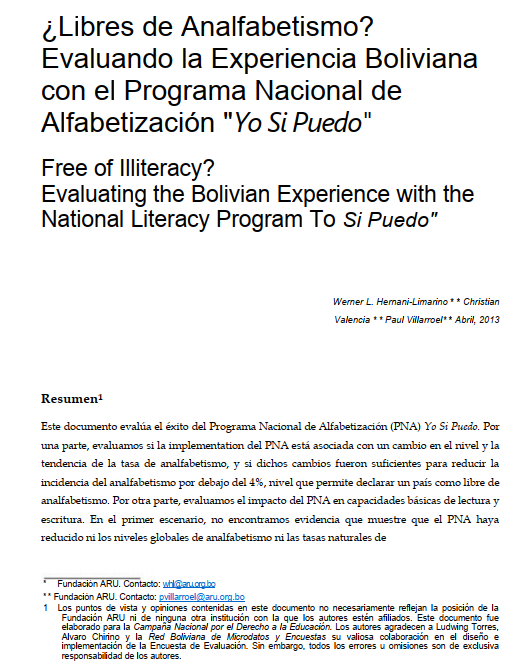¿Libres de Analfabetismo? Evaluando la Experiencia Boliviana con el Programa Nacional de Alfabetización "Yo Sí Puedo"
DOI:
https://doi.org/10.35319/lajed.20150376Palabras clave:
Evaluación de impacto, programas de alfabetización, educaciónResumen
Este documento evalúa el éxito del Programa Nacional de Alfabetización (PNA) Yo Sí Puedo. Por una parte, evaluamos si la implementación del PNA está asociada con un cambio en el nivel y la tendencia de la tasa de analfabetismo, y si dichos cambios fueron suficientes para reducir la incidencia del analfabetismo por debajo del 4%, nivel que permite declarar un país como libre de analfabetismo. Por otra parte, evaluamos el impacto del PNA en capacidades básicas de lectura y escritura. En el primer escenario, no encontramos evidencia que muestre que el PNA haya reducido ni los niveles globales de analfabetismo ni las tasas naturales de reducción del analfabetismo con excepción del caso de las mujeres en el área urbana. En el segundo escenario, las estimaciones del impacto del PNA son cuantitativamente pequeñas estadísticamente significativas en el indicador de lectura mecánica, estadísticamente rentes de cero en los dos indicadores de lectura comprensiva, y cuantitativamente pequeñas pero estadísticamente significativas en los indicadores de comunicación escrita. Si bien nuestros resultados son inconsistentes con los pronunciamientos oficiales que declaran a como territorio libre de analfabetismo, coinciden con otras evaluaciones que muestran ineficacia e ineficiencia de los programas de alfabetización de adultos.
Descargas
Citas
Abadie,A. and G. Imbens (2002). Simple and bias-corrected rnatching estimatorsfor average treatment effects. National Bureau of Economic Research.
Abadie, A. and G. Imbens (2008). Bias Corrected Matching Estimators for Average Treatment Effects. Unpublish manuscript, Harvard University.
Abadzi, H. (1994). What we know about acquisition of adult literacy: is there hope?. Taylor & Francis.
Abadzi, H. (2003). lmproving adult literacy outcomes: lessons from cognitive research for developing countries. World Bank Publications.
Canavire, VB. (20 l l). Educación para adultos en América Latina: programa de alfabetización Yo, S 't Puedo ". Instituto de Investigaciones en Educación de la Universidad Veracruzana.
Canfux, J. and Liendo, T. (2008). Evaluación Del Impacto Del Programa Nacional de Alfabetización de Bolivia. Instituto Internacional de Investigación Educativa para la Integración Convenio Andrés Bello Ministerio de Educación y Cultura de Bolivia, Editorial Campos iris, La Paz, Bolivia.
Canfux, J., Liendo, T. and Mora, D., (2008). Experiencias sobre el Programa Nacional de Alfabetización en Bolivia. Instituto Internacional de Investigación Educativa para la Integración Convenio Andrés Bello Ministerio de Educación y Cultura de Bolivia, La Paz, Bolivia
Chowdhury, K.P and World Bank.(1995).Literacy and primary education. World Bank, Human Resources Development and Operations Policy.
República de Bolivia.(2006). Decreto Supremo No 28675.
Horvitz, D., and D.Thompson (1952).A genralization of Sampling Without Replacement from a Finite Universe, Journal of the American Statistical Association,47,663-685.
lmbens, Guido and Jeffrey Wooldridge (2008). Recent Developments in the Econometrics of Program Evaluation IZA Discussion Paper NO.3640.
Mora, D.and Canfux, J. (2009).Alfabetización y Emancipación. Memorias y reflexiones sobre el proceso de la alfabetización en Bolivia. Instituto Internacional de Investigación Educativa para la Integración Convenio Andrés Bello Ministerio de Educación y Cultura de Bolivia, Editorial Ipasme, La Paz, Bolivia
Neijs, K. ( 1961). Las cartillas de alfabetización: Preparación, evaluación y empleo, Unesco.
Ortega, D. and Rodríguez, F. and Miguel, E. (2006). Freed from illiteracy? Acloser look at Venezuelas Robinson Literacy Campaign Wesleyan Economics Working Papers
Romain, R.I. and Amstrong, L.A. (1987). Review of World Bank operations in nonformal education and training, World Bank, Education and Training Dept., Policy Division.
Weisbort, M. and Rosnick, D. (2008). Illiteracy Revisted: What Ortega and Rodríguez Read in the Household Survey, Center for Economic and Policy Research (CEPR)
Schaffner, J. (2005). Subjective and objetive measures of literacy: implications for current results-oriented development initiatives, International Journal of Educational Development
Rubin, D.(1973). The use of Matched Sampling and Regression Adjustments to Remove Bias in Observational Studies, Biometrics, 29, 185-203
Rubin D. (2006). Matched Sampling for Casual Effects, Cambridge University Press, Cambridge, UK.
Wooldridge, J. (2007). Inverse Probability Weighted M-Estimators for General Missing Data Problems, Journal of Econometrics.





